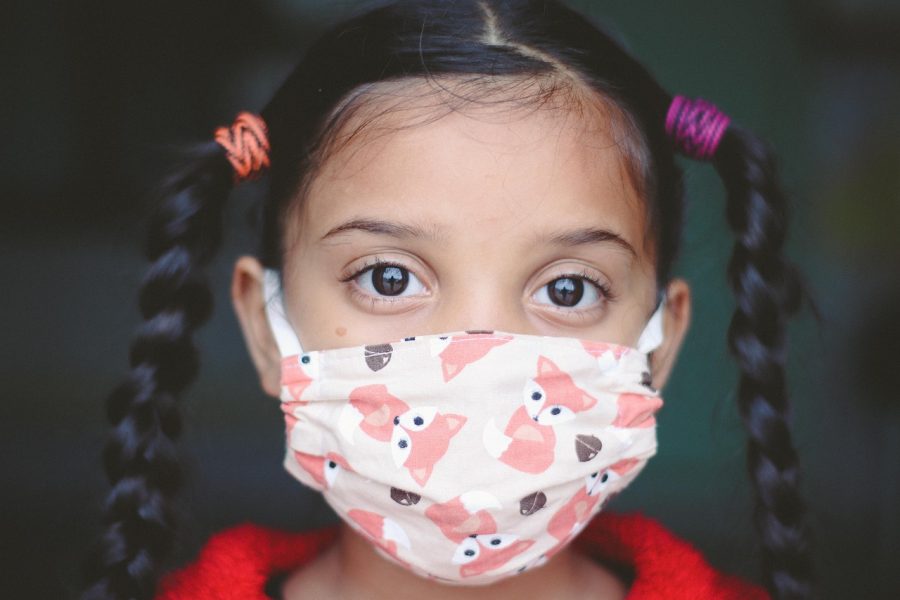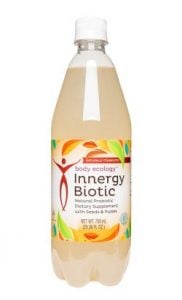
COVID-19 and probiotics: Research is leading us to important answers
We’ve already looked at the use of probiotics to help prevent and treat diarrhea associated with COVID-19, but could probiotics have other benefits against the virus? It seems so. Extensive research suggests that probiotics support balance in the immune system and may even help ward off the damaging cytokine storms responsible for some of the severest symptoms of COVID.
Along with beneficial microbes that support immune function and help aid digestion, InnergyBiotic contains high-performance peptides and restorative antioxidants. Click here to learn more about our top-selling, low-calorie probiotic power shot and mixer.
What is a cytokine storm, and what does it have to do with COVID?
Cytokines are chemical messengers, many of which are considered biomarkers of systemic inflammation. Some cytokines even trigger the release of other cytokines, so it’s easy to see how systemic inflammation can arise even from small pockets of localized inflammation in the body. In COVID-19, a cytokine storm is a damaging inflammatory response caused by the production of huge numbers of proinflammatory cytokines.
Cytokines that are biomarkers for inflammation and that are commonly seen in cases of COVID-19 include:
- Interleukin 6 (IL-6)
- Tumor necrosis factor alpha (TNF-alpha)
- Interleukin 1-beta (IL-1-beta)
- C-reactive protein (CRP)
These biomarkers also link to diabetes and atherosclerosis, as well as other age-related conditions. In cases of COVID, the cytokine storm can cause damage to the cardiovascular system, lungs, gastrointestinal tract, liver, kidneys, small blood vessels, and even the eyes and brain.1
Cytokine storms often lead to admission to the intensive care unit and the need for intubation as uncontrolled production of proinflammatory cytokines can lead to organ failure and acute respiratory distress syndrome (ARDS).
The tricky thing, though, is that the body produces cytokines in response to injury and invasion by viruses and other foreign organisms in an attempt to fight these off. As such, eliminating cytokines entirely is unhelpful and even harmful as this prevents a healing response and destruction of pathogens.
As with so many things, there’s a balance to be found in allowing and supporting the body to defend itself, while preventing healthy immune responses from getting out of hand. Effectively, COVID-19 cytokine storms are thought to be a sign of an immune system ill-equipped to respond appropriately to infection. This is where immune-supportive nutrients, such as zinc and vitamin D, come in, as well as probiotics.
Not all probiotics are created equal: See what makes Body Ecology’s probiotics stand out.
Could immune-regulating probiotics help calm COVID cytokine storms?
Probiotics have been recognized for a while now as important in regulating the immune response. Certain strains have been shown to modify the balance between proinflammatory and immunoregulatory cytokines, for instance.2 This would support clearance of viruses, while keeping immune-system-induced lung damage to a minimum.
Probiotics can improve levels of type I interferons; increase the number and activity of antigen presenting cells, Natural Killer cells, and T cells; and elevate levels of systemic and mucosal-specific antibodies in the lungs.3-5 L. plantarum and L. paracasei, when administered in toothpaste, were seen in one study to reduce gum inflammation — inhibiting the release of multiple inflammatory mediators from monocytes, including IL-6, IL-8, and prostaglandin E2.6
In one randomized, controlled trial:7
- The probiotic strain Lactobacillus plantarumDR7 suppressed proinflammatory cytokines interferon-gamma and TNF-alpha in middle-aged adults and enhanced anti-inflammatory cytokines IL-4 and IL-10 in young adults (under the age of 30).
- The probiotic was also associated with reduced levels of plasma peroxidation and oxidative stress, suggesting less tissue damage due to inflammation and oxidation.
- And those taking the probiotics for at least four weeks had reduced frequency of upper respiratory tract infections and duration of nasal symptoms after 12 weeks, compared with a placebo group.
Probiotics may also help in COVID-19 simply by competing with and inhibiting the growth of pathogenic organisms, such as Clostridium difficile and Streptococcus pneumoniae. In one study, patients on mechanical ventilators in the ICU were significantly less likely to develop ventilator-associated pneumonia (VAP) if given the probiotic Lactobacillus rhamnosus GG.8 They were also less likely to develop diarrhea resulting from C. difficile infection.
In another small study involving 100 critically ill adults undergoing mechanical ventilation, those who received a probiotic containing Lactobacillus, Bifidobacterium, and Streptococcus spp. daily for 14 days had a lower incidence of VAP and were released from the ICU faster than those who received a placebo.9 The probiotic group also had less gastrointestinal upset, as well as a decrease in multidrug‐resistant pathogens (though this didn’t reach statistical significance).
Unfortunately, a growing number of studies show that people with COVID-19 often have dysbiosis, or an imbalance in gut flora. Interestingly, some researchers are making the connection between dysbiosis being common in people with cardio-cerebrovascular diseases, hypertension, and diabetes and the same group of folks being more likely to end up needing ICU care due to COVID-19.10
Important insight into the future of COVID-19 and probiotic research
While there’s a lot of support for the use of probiotics in restoring a depleted microbiome and helping to prevent respiratory tract infections, there’s not yet all that much research looking specifically at probiotics for COVID-19.
However:
- There are many trials underway, including one looking at the effect of Lactobacillus rhamnosus GG (LGG) in people exposed to COVID-19 through household contacts, as well as at the effect of COVID-19 on the microbiome.11
- Another clinical trial, this time in Italy, is focusing on the adjuvant use of oxygen ozone therapy plus probiotic supplementation in the early control of COVID-19.12 The researchers, who wrapped up the study at the end of December, noted that “hospitalization, dietary changes, use of antibiotics, and systemic inflammation related to COVID-19 are all variables that contribute to changes in the intestinal and lung microbiota with significant repercussions on the outcomes of the disease,” and that the use of ozone therapy could also affect microbial flora, with probiotic supplementation likely to help correct dysbiosis.
- Other studies are looking at the benefits of probiotics alongside other treatments, such as azithromycin and hydroxychloroquine. Specifically, one study that wrapped up in June looked at the use of these drugs alongside multi-strain probiotics that included: Streptococcus thermophilus DSM322245, Bifidobacterium lactis DSM 32246, Bifidobacterium lactis DSM 32247, Lactobacillus acidophilus DSM 32241, Lactobacillus helveticus DSM 32242, Lactobacillus paracasei DSM 32243, Lactobacillus plantarum DSM 32244, and Lactobacillus brevis DSM 27961.13
Without the results of these studies, it’s hard to know which probiotic strains, if any, are best for countering COVID-19. However, we do know a lot about the immune system effects of many probiotic strains already, with L. rhamnosus looking particularly promising, alongside L. paracasei and L. plantarum.
Different strains of L. plantarum are found in abundance in fermented vegetables. Having diversity is the key to a healthy gut and a hardy immune system. Diversity can be found in fermented vegetables and in our probiotic liquids.
REFERENCES:
- 1. Bhaskar S, Sinha A, Banach M, et al. Cytokine Storm in COVID-19-Immunopathological Mechanisms, Clinical Considerations, and Therapeutic Approaches: The REPROGRAM Consortium Position Paper. Front Immunol. 2020;11:1648. Published 2020 Jul 10. doi:10.3389/fimmu.2020.01648.
- 2. Baud D, Dimopoulou Agri V, Gibson GR, Reid G, Giannoni E. Using Probiotics to Flatten the Curve of Coronavirus Disease COVID-2019 Pandemic. Front Public Health. 2020;8:186. Published 2020 May 8. doi:10.3389/fpubh.2020.00186.
- 3. de Vrese M, Winkler P, Rautenberg P, Harder T, Noah C, Laue C, Ott S, Hampe J, Schreiber S, Heller K, Schrezenmeir J. Effect of Lactobacillus gasseri PA 16/8, Bifidobacterium longum SP 07/3, B. bifidum MF 20/5 on common cold episodes: a double blind, randomized, controlled trial. Clin Nutr. 2005 Aug;24(4):481-91. doi: 10.1016/j.clnu.2005.02.006. Epub 2005 Apr 21. PMID: 16054520.
- 4. Zelaya H, Alvarez S, Kitazawa H, Villena J. Respiratory Antiviral Immunity and Immunobiotics: Beneficial Effects on Inflammation-Coagulation Interaction during Influenza Virus Infection. Front Immunol. 2016 Dec 23;7:633. doi: 10.3389/fimmu.2016.00633. PMID: 28066442; PMCID: PMC5179578.
- 5. Namba K, Hatano M, Yaeshima T, Takase M, Suzuki K. Effects of Bifidobacterium longum BB536 administration on influenza infection, influenza vaccine antibody titer, and cell-mediated immunity in the elderly. Biosci Biotechnol Biochem. 2010;74(5):939-45. doi: 10.1271/bbb.90749. Epub 2010 May 7. PMID: 20460726.
- 6. Tim Schmitter, Bernd L. Fiebich, Joerg T. Fischer, Max Gajfulin, Niklas Larsson, Thorsten Rose & Marcus R. Goetz (2018) Ex vivo anti-inflammatory effects of probiotics for periodontal health, Journal of Oral Microbiology, 10:1, DOI: 10.1080/20002297.2018.1502027.
- 7. Chong HX, Yusoff NAA, Hor YY, Lew LC, Jaafar MH, Choi SB, Yusoff MSB, Wahid N, Abdullah MFIL, Zakaria N, Ong KL, Park YH, Liong MT. Lactobacillus plantarum DR7 improved upper respiratory tract infections via enhancing immune and inflammatory parameters: A randomized, double-blind, placebo-controlled study. J Dairy Sci. 2019 Jun;102(6):4783-4797. doi: 10.3168/jds.2018-16103. Epub 2019 Apr 4. PMID: 30954261.
- 8. Morrow LE, Kollef MH, Casale TB. Probiotic prophylaxis of ventilator-associated pneumonia: a blinded, randomized, controlled trial. Am J Respir Crit Care Med. 2010 Oct 15;182(8):1058-64. doi: 10.1164/rccm.200912-1853OC. Epub 2010 Jun 3. PMID: 20522788; PMCID: PMC2970846.
- 9. Mahmoodpoor A, Hamishehkar H, Asghari R, Abri R, Shadvar K, Sanaie S. Effect of a Probiotic Preparation on Ventilator-Associated Pneumonia in Critically Ill Patients Admitted to the Intensive Care Unit: A Prospective Double-Blind Randomized Controlled Trial. Nutr Clin Pract. 2019 Feb;34(1):156-162. doi: 10.1002/ncp.10191. Epub 2018 Aug 8. PMID: 30088841.
- 10. Ferreira C, Viana SD, Reis F. Gut Microbiota Dysbiosis-Immune Hyperresponse-Inflammation Triad in Coronavirus Disease 2019 (COVID-19): Impact of Pharmacological and Nutraceutical Approaches. Microorganisms. 2020;8(10):1514. Published 2020 Oct 1. doi:10.3390/microorganisms8101514.
- 11. Effect of Lactobacillus on the Microbiome of Household Contacts Exposed to COVID-19. ClinicalTrials.gov Identifier: NCT04399252. May 22, 2020.
- 12. Oxygen-Ozone as Adjuvant Treatment in Early Control of COVID-19 Progression and Modulation of the Gut Microbial Flora (PROBIOZOVID). ClinicalTrials.gov Identifier: NCT04366089. April 28, 2020.
- 13. Bacteriotherapy in the Treatment of COVID-19 (BACT-ovid). ClinicalTrials.gov Identifier: NCT04368351. April 29, 2020.









